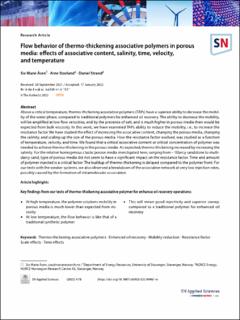| dc.contributor.author | Åsen, Siv Marie | |
| dc.contributor.author | Stavland, Arne | |
| dc.contributor.author | Strand, Daniel | |
| dc.date.accessioned | 2022-06-24T06:57:18Z | |
| dc.date.available | 2022-06-24T06:57:18Z | |
| dc.date.created | 2022-05-24T13:02:29Z | |
| dc.date.issued | 2022 | |
| dc.identifier.citation | SN Applied Sciences. 2022, 4 (3), . | en_US |
| dc.identifier.issn | 2523-3963 | |
| dc.identifier.uri | https://hdl.handle.net/11250/3000460 | |
| dc.description.abstract | Above a critical temperature, thermo-thickening associative polymers (TAPs) have a superior ability to decrease the mobility of the water phase, compared to traditional polymers for enhanced oil recovery. The ability to decrease the mobility, will be amplified at low flow velocities, and by the presence of salt, and is much higher in porous media than would be expected from bulk viscosity. In this work, we have examined TAPs ability to reduce the mobility, i.e., to increase the resistance factor. We have studied the effect of increasing the associative content, changing the porous media, changing the salinity, and scaling up the size of the porous media. How the resistance factor evolved, was studied as a function of temperature, velocity, and time. We found that a critical associative content or critical concentration of polymer was needed to achieve thermo-thickening in the porous media. As expected, thermo-thickening increased by increasing the salinity. For the relative homogenous clastic porose media investigated here, ranging from ~ 1Darcy sandstone to multidarcy sand, type of porous media did not seem to have a significant impact on the resistance factor. Time and amount of polymer injected is a critical factor: The buildup of thermo-thickening is delayed compared to the polymer front. For our tests with the weaker systems, we also observed a breakdown of the associative network at very low injection rates, possibly caused by the formation of intramolecular association. | en_US |
| dc.language.iso | eng | en_US |
| dc.rights | Navngivelse 4.0 Internasjonal | * |
| dc.rights.uri | http://creativecommons.org/licenses/by/4.0/deed.no | * |
| dc.title | Flow behavior of thermo-thickening associative polymers in porous media: effects of associative content, salinity, time, velocity, and temperature | en_US |
| dc.title.alternative | Flow behavior of thermo-thickening associative polymers in porous media: effects of associative content, salinity, time, velocity, and temperature | en_US |
| dc.type | Journal article | en_US |
| dc.type | Peer reviewed | en_US |
| dc.rights.holder | © The Author(s) 2022 | en_US |
| dc.description.version | publishedVersion | en_US |
| cristin.ispublished | true | |
| cristin.fulltext | original | |
| cristin.qualitycode | 1 | |
| dc.identifier.doi | 10.1007/s42452-022-04961-w | |
| dc.identifier.cristin | 2026959 | |
| dc.source.journal | SN Applied Sciences | en_US |
| dc.source.volume | 4 | en_US |
| dc.source.issue | 3 | en_US |
| dc.source.pagenumber | 0 | en_US |

